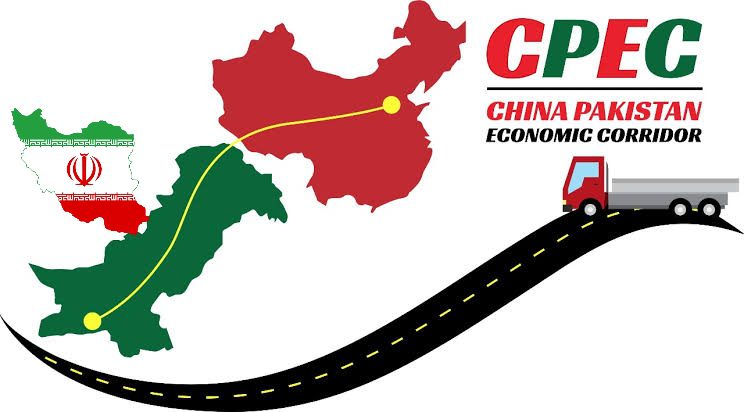Recent developments in the region and beyond augur a significant paradigm shift. Rapid alignment and rebalancing approaches adopted by regional countries are indicative of a new cold war. United States has begun to step up its ante against China, by prominently empowering India. India on the other hand, governed by a Hindutva-dominated BJP regime has pursued an expansionist approach. It has strained its relations with almost all its neighbors, predominately Nepal and China in recent months. What was a bolt from the blue for India, was reports of Indian ouster from Chabahar rail project? Iranian government announced to invest $400 million on the project which would connect Chabahar port with Zahidan and subsequently lead to Hajigak in Afghanistan. Previously, New Delhi had planned to invest on the project which would have helped India extract iron deposits of worth $3 billion from Hajigak and ultimately extend trade links to Central Asia.
This was followed by murmurs of Iran-China deal. Initial reports on the prospective deal suggest it to be a strategic partnership between the two states. The 25-year deal of worth $400 billion would encompass trade and security dimensions. It will have far reaching effects on regional security, and act as a catalyst for the undergoing geo-strategic shift. Furthermore, Israel-UAE deal brokered by the United States would further enhance the prospects of Sino-Iran rapprochement.
Under the strategic agreement, final proclamation of which is yet to be made official by Beijing, China will invest in energy, infrastructure, telecommunications, and banking sectors of Iran. This will send alarm bells to several capitals. However, Pakistan is among the beneficiaries of the deal, and welcomed the pact with zeal. China Pakistan Economic Corridor, being the flagship project of Belt and Road Initiative, had to face several roadblocks due to turbulent border along Iran and Indian influence. The proposed agreement would drastically reduce Indian influence and replace it by China with enhanced role in the country. It is indeed a win-win game for China, Iran, and Pakistan. Whereas Tehran is desperate for foreign investment, China needs uninterrupted flow of energy. Pakistan needs both, by making best use of its geography.
Isolation of Iran by West in the wake of decomposition of Joint Comprehensive Plan of Action (JCPOA), has urged Iran to forge new allies. China is increasingly looking to expand its regional economic and political clout through partnership and connectivity. Moreover, US withdrawal from Afghanistan, magnifies the opportunities for both China and Iran.
Expulsion of India from the rail project, and advent of China in Iran, have significant implications for Pakistan, whose economy is closely allied with China and its security heavily reliant on secure western border. Certainly, Pakistan views the deal with admiration and opportunity. However, many commentators have raised concerns that China’s cooperation with Iran and consequent overtake of Chabahar and Bander Abbas ports would downgrade Gwadar’s relevance. Nevertheless, Gwadar’s geo-strategic significance cannot be minified. Nothing other than Gwadar offers shortest route to China, which is the underlying objective of Beijing. China does not share any border with Iran. For any trade link to be established between China and Iran, the route must pass through a third state. Given Afghanistan’s volatile political and security situations, it is highly unlikely to be considered as a viable option. Pakistan offers the most appropriate alternative for their linkage. Sino-Iran accord would potentially compound the significance of CPEC. Tehran has at times expressed its willingness to be included into CPEC. It has the practical capability to link Chabahar with Gwadar, complementing each other and acting as sister ports. Moreover, Iran’s incorporation into the ‘China League’, would isolate India and drastically attenuate the security risks posed to CPEC. Agile Indian presence in Iran, under the guise of geo-economic partnership constituted consequential threats to China Pakistan Economic Corridor. With New Delhi’s exit and probable China’s substitution, western border offers a reassurance that Iranian territory will not harbor anti-Pakistan elements. In the past, as do so in present, Baloch militants have carried out cross border attacks on security apparatus of Pakistan and projects related to CPEC. Similarly, Gwadar port has and continues to face instability due to its proximity to precarious Iranian border. Neutralizing this security threat, which has been a major obstruction for the fruition of the mega project, would be instrumental for Pakistan’s economic outlook. Furthermore, looking from a broader regional security perspective, inclusion of Iran with its compatible interests with Pakistan and a post-US withdrawal from Afghanistan, presents a more connected and stable region. China is striving hard to fill the vacuum created by potential US exit and Indian expulsion from Iran, both of which are in Pakistan’s national interest. Additionally, Pakistan and Iran have converging interests in Afghanistan. A China-led political and economic primacy is neither challenged by Pakistan nor Iran, specifically at a time when US is more assiduously aligned with India and Gulf nations. It is therefore presumably safe to state that the projected Sino-Iran strategic agreement will complement CPEC and act as a booster for regional connectivity.
Author: Majid Essa Ali
About Author: Author is BS International Relations & has interests in Security situation in Baluchistan and foreign entanglements, Sino-American rivalry and impacts on Pakistan.
Edited By: Talha Ahmad (Editor in Chief PSF)
Note: The views expressed in this article are the author’s own and do not necessarily reflect the editorial policy of Pakistan Strategic Forum.
#TeamPakistanStrategicForum






